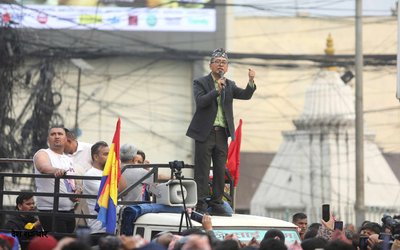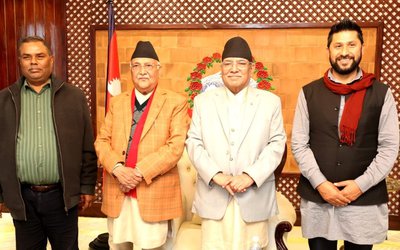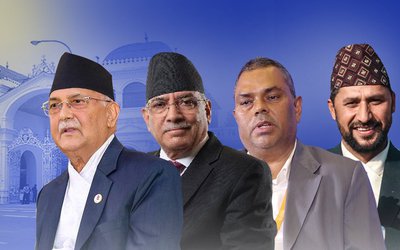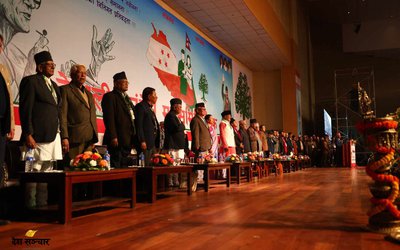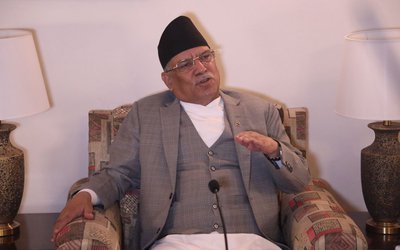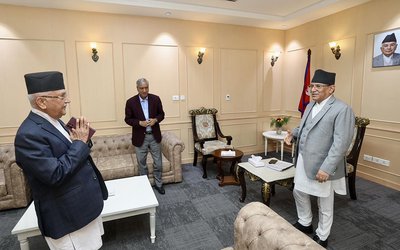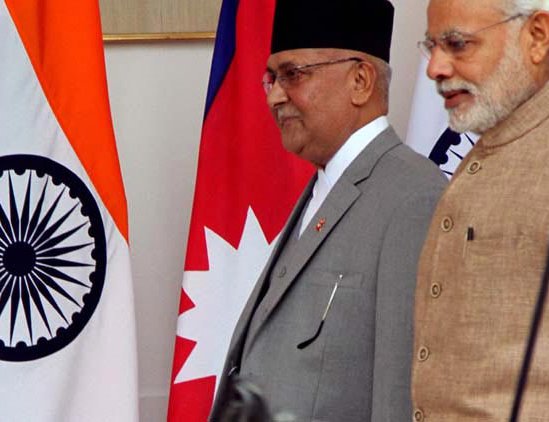
A week ago, Narendra Modi, called K P Oli, chairman of the Communist Party of Nepal-Unified Marxist Leninist, to convey that he was eagerly waiting for Oli’s visit to Delhi as prime minister. The two leaders share a love-hate relationship marred by deep distrust. However, Oli was as warm as the Indian prime minister. “Excellency, we are as eager to welcome you in Nepal, and take you to Janakpur, Lumbini and Muktinath, the shrines that you wanted to visit during your last trip, but could not,” Oli, who was in the midst of a meeting of UML and Maoist leaders, is said to have told Modi.
The conversation, on the one hand, appears like an attempt by New Delhi to instil confidence among Nepali leaders, especially Oli, that India has come to terms with the recent poll mandate and it wants to leave behind the bitterness of the past. However, one telephone call from Modi, or a visibly warm reciprocal gesture by Oli, may not put the deeply impaired bilateral relationship on track. At the World Economic Summit in Davos, Modi talked about India’s “magnanimity” to its neighbours. He told the world that India was the first to reach out when the devastating earthquake stuck Nepal in 2015.
Oli’s reference about Modi not having been able to visit three shrines despite his wish during his last Nepal visit (November 2014) reveal how official agencies and actors, on both sides, work quietly to repair the relations. The then Nepali prime minister, Sushil Koirala, apparently got to know about the cancellation of Modi’s trip to Janakpur only after his deputy prime minister and party colleague, Bimalendra Nidhi, considered very close to then Indian ambassador in Kathmandu, issued a statement. How is it that the deputy PM got to know about the cancellation of Modi’s trip before the PM? And, who authorised Nidhi to make it public?
There has been a clash of perceptions in Nepal regarding what Indian policymakers want. The bureaucracy, especially the MEA under the UPA regime, collaborated with the Maoists, Nepali Congress, CPN-UML and the Madhesi groups, to force radical agendas — republicanism, federalism and secularism — on the country without involving the people. There is deep suspicion in political circles about the commitment or willingness of Modi, the BJP and its mother organisation, the RSS, to the principles that Nepal has come to adopt after 2006. Blocking Modi’s trip to the shrines and preventing any possible interaction with the people unhappy with the radical changes was a way of keeping him in the dark. The Indian embassy, which collaborated with Nepali politicians to promote the radical agenda and enjoyed power without accountability, also had a vested interest in keeping Modi “misinformed”.
But with some of the key architects who crafted the radical agenda for Nepal openly admitting that Indian diplomacy has failed in Nepal, Modi will be able to see for himself and conclude what has gone wrong for Delhi in Nepal. He should then be able to make the necessary corrections if he desires. There is little doubt in Nepal that the new constitution is not working. The formation of the government has been prolonged endlessly and the affairs in the provinces, formed for the first time under the federal set-up, are in a deep mess. “This constitution will continue to trouble the country, but removing it will be difficult,” says constitutional expert and former speaker of parliament, Damannath Dhungana.
The current care-taker government of Sher Bahadur Deuba, chief of the Nepali Congress, has been taking populist measures — for instance, bringing all the citizens above the age of 65 within the ambit of social security schemes and offering the golden hand-shake option to around 22,000 bureaucrats who have completed 20 years in service and are approaching the age of 50. “These schemes will cost the state around 550 billion rupees. This is unfair, unethical and unacceptable,” says Oli. The Deuba cabinet has also declared all the civilians and security persons killed by Maoist guerrillas during the insurgency martyrs, a decision that may pit political parties against each other.
An empty coffer that has forced the state to borrow internally to pay salaries to government staff, a confrontation among internal actors, a constitution that will be understood and interpreted differently by its makers, a sluggish economy and a judiciary, including the supreme court that public figures have openly started calling biased and corrupt, are what defines post-election Nepal. Yet, Nepali politicians may refuse to introspect and sort out the mess, and instead, blame outside forces including India. Modi, perhaps, seems to have foreseen it; the call to Oli was a preventive gesture.
Courtesy: Indian Express

Yubaraj Ghimire
Ghimire is a Kathmandu based journalist.
- Why ‘Revolutionary’ Communist PM Prachanda Went To Temples In India
- Jun 08, 2023
- Why China Is Happy With Nepal’s New PM
- Jan 03, 2023
- Prachanda Sworn In As PM: New Tie-ups In Nepal, Concern In India
- Dec 27, 2022
- Young TV Anchor As Its Face, RSP Rise Takes Nepal By Surprise
- Nov 23, 2022
- Nepal Votes, Why The Verdict May Not Make New Delhi Very Happy
- Nov 23, 2022

